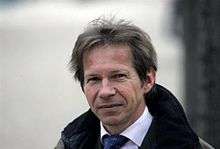Jean-Marc Jancovici
| Jean-Marc Jancovici | |
|---|---|
 | |
| Born | 1962 (age 55–56) |
| Nationality | French |
Jean-Marc Jancovici (born 1962) is a French engineering consultant, energy and climate expert. He is a business leader, consultant, professor, conference speaker, writer, and independent columnist. He is co-founder and associate at the Carbone 4 consultancy firm, and the founding president of the think-tank The Shift Project.
Biography
He graduated from the École polytechnique in 1985 and from the Ecole nationale supérieure des télécommunications de Paris in 1986.
He is the author and the main developer of the main French carbon accounting method, the Bilan Carbone assessment tool for the French Inter-ministerial Greenhouse Gas Mission.
He collaborated with Nicolas Hulot for 11 years, and co-authored the Pacte écologique, a book that directly led to the Grenelle Environnement during the first years of Nicolas Sarkozy's presidency. He is a member of the SOeS Scientific Committee (MEEDDEM observation and statistics department) and a member of the Fondation Nicolas-Hulot Strategic Committee.[1]
He is the founding president of The Shift Project, a corporate sponsored think tank established in 2010, which advocates a progressive phase out of fossil fuels from our economy.
In 2007 he founded the Carbone 4 consultancy with the economist Alain Grandjean. Carbone 4 is a Paris-based consultancy employing around 30 people, which has specialized in adapting human activities (especially economic activities) to any kind of energy constraint (lack of oil, lack of gas, lack of electricity, rising prices, rising constraints on greenhouse gas emissions, new norms or regulations, etc.)
He founded two other organisations focused on spreading scientific knowledge about energy and climate change (still active), and is currently chairing the environment section of his alumni, X Environnement. He teaches at Mines ParisTech to first year students on energy and climate change basics.
He is a member of the association ASPO France, which studies the oil peak and its consequences.
Private life
He is married and has two daughters.
He eats little meat, uses public transport, has no cellphone and avoids air travel whenever possible.[2]
Media, lectures, internet, website
He is the author of six books (one of them translated into six languages), and has written for a number of French media (France Info, TF1, Les Echos).
His vision
The whole economy of occidental countries is based on plentiful and cheap energy. 80% of the world's energy consumption is derived from fossil fuels (oil, gas and coal). Oil and gas have reached their peak production and will become inexorably depleted.
GDP depends on the quantity of energy available;[3] this is why economic growth, of European Union, for instance, will stop very soon to enter a phase of recession and social crisis.
On the other hand, burning these high-carbon fuels will cause the start of high climate change, non-reversible for a thousand years. He reminds us that the average earth temperature difference between the latest ice-age (c.10, 000 BC) and 1950 is around +5 °C. According to the IPCC, the temperature will rise by +3 °C or +4 °C between 1950 and 2100 if the biggest polluting countries do not respect their commitments to the COP 21. The consequences, such as water stress, starvation, mass migrations, and wars, would be catastrophic.
He recommends particularly that all coal powered stations should be decommissioned within 30 years. The carbon tax will be an essential tool to change the economy.
France needs to make a concerted effort to start re-structuring its old system moving to a decarbonized economy (thermal renovation of building, transformation of agriculture, construction of small cars, transformation of heavy industry, urban densification, etc.) By mimetism, this ambitious goal could be an example for Europe, and Europe could be an example for the world.
According to him, nuclear energy is a necessary evil to reduce climate change (there are far more victims of hydraulic energy, or coal, than of civil nuclear power). He also believes that renewable energies (Photovoltaic and wind energy) will not offset the decline of fossil energies to guaranty us the same living standard.[4][5][6][7]
Publications
- "Dormez tranquilles jusqu'en 2100, et autres malentendus sur le climat et l'énergie" (Odile Jacob, 2015)
- "Transition énergétique pour tous" (2011, Odile Jacob)
- "C’est maintenant ! 3 ans pour sauver le monde" with Alain Grandjean (Janvier 2009, Le Seuil)
- "Le changement climatique expliqué à ma fille" (Janvier 2009, Le Seuil)
- "Le Plein s’il vous plaît" with Alain Grandjean (Le Seuil, Février 2006)
- "L'effet de serre, allons-nous changer le climat ?" with Hervé Le Treut (Flammarion, 2004)
- "L'avenir climatique, quel temps ferons-nous ?" (Le Seuil, 2002)
References
- ↑ "Archived copy". Archived from the original on August 22, 2012. Retrieved April 23, 2016.
- ↑ "Se passer de voiture au quotidien : est-ce possible ?". Manicore.com. Retrieved 2016-04-27.
- ↑ Gaël Giraud; Zeynep Kahraman (2014-04-10). ""How Dependent is Growth from Primary Energy ? Output Energy Elasticity in 50 Countries (1970-2011)", CNRS" (PDF). Parisschoolofeconomics.eu. Retrieved 2016-04-27.
- ↑ "Manicore". Manicore.com. Retrieved 2016-04-27.
- ↑ "Manicore". Manicore.com. Retrieved 2016-04-27.
- ↑ "Manicore". Manicore.com. Retrieved 2016-04-27.
- ↑